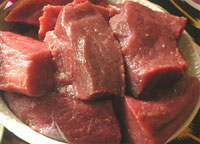Russians turn down meat and rethink their spending
Millions of people revise their every-day meals for economic reasons and exclude expensive food from their diet. Europeans and Russians now prefer to eat less meat and switch from expensive kind of meat, beef that is, to something less expensive – poultry and pork. Such new tastes may ruin European breeders, particularly beef suppliers. In the meantime, the UN reminded that the number of people suffering from hunger reached 963 million in 2008, which means that every sixth person on the planet is hungry.

UN experts think that a nationwide hunger is not likely to happen in Russia, although many Russians will be forced to change their eating preferences, they add. India, China, Indonesia and poor Asian and African countries (Bangladesh, Congo, Ethiopia and Pakistan) will be the most problematic countries at this point. The Food and Agriculture Organization of the United Nations (FAO) is also concerned about the countries that reduce their food imports. Russia, for example, refused from the import of the French pork, which posed a serious danger to the nation’s pork-making industry.
Russian experts confirm that the meat branch suffers the largest losses in the food industry because of the crisis. People prefer to buy pork instead of beef. One-third of the Russian meat is imported. The dollar rate has skyrocketed against the ruble recently, which is bad news for the population and very good news for Russian meat-makers: meat imports will not be growing.
Russia’s refusal from the import of French pork coincided with a report from the US Department of Agriculture, which said that Russia planned to increase its pork import on the US market.
International experts say that the consumption of meat in Europe will drop by 400,000 tons in 2009. Many prefer to eat less meat and consume more beans, cabbage and carrots instead.
The level of consumption in Russia dropped to the lowest level during the recent three years. The inflation rate made up 17 percent over the recent three months, opinion polls show.
Many Russians are very concerned about the growing level of unemployment in the country. About 72 percent of the polled said that their employment perspective for this year were either ‘bad’ or ‘not very good.’ Only 25 percent of the respondents said that they were certain of their jobs, although the percentage of such people in September and October was a lot higher – 50 percent.
The majority of Russian consumers said that they could notice prices on food stuffs and basic goods growing considerably – by 17 percent in three months. Many said that the prices were going up just because of the beginning of the new year, not because of the crisis.
Many Russians have not reorganized their spending yet. Many still plan to purchase new goods, although the number of those, who think that the year 2009 will be a very bad time for new purchases, has increased. Most Russians do not perceive the current state of affairs in the nation as a crisis – the people are being confused about the recent changes.
The research showed that the need to change the consumption pattern and the habitual lifestyle would be one of the most unpleasant possible consequences of the crisis.
Over 73 percent of the polled Russians said that they became more selective in their choice of food stuffs. Over 20 percent of the polled said that they started to buy smaller amounts of food. Nevertheless, about 68 percent said that they did not change their preferences. People buy less cakes, sweets, beer, meat and mineral water. The consumption of tea, milk, shampoos, detergents and cigarettes has not changed.
Source: agencies
Subscribe to Pravda.Ru Telegram channel, Facebook, RSS!

